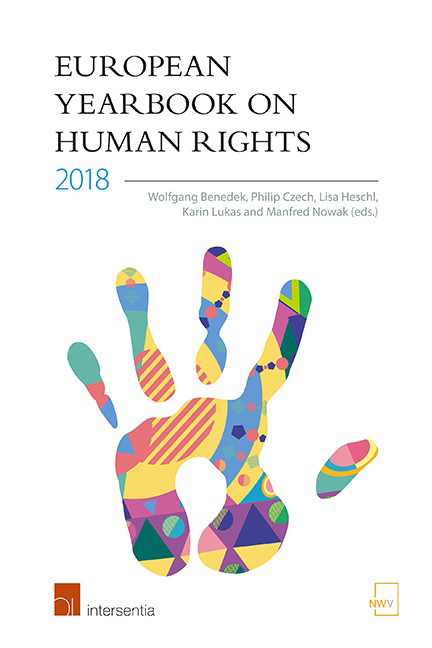Book contents
- Frontmatter
- Scientific Advisory Board
- Editors’ Preface
- Contents
- List of Abbreviations
- List of Contributors
- Part I Topic Of The Year
- Part II Eu
- Part III Coe
- PART IV OSCE
- Part V Others
- Part VI Book Reviews
- Katja S. Ziegler, Elizabeth Wicks and Loveday Hodson (eds.): The UK and European Human Rights – A Strained Relationship?
- Emily Reid: Balancing Human Rights, Environmental Protection and International Trade – Lessons from the EU Experience
- Nicole Bürli: Third-Party Interventions before the European Court of Human Rights
- Stijn Smet and Eva Brems (eds.): When Human Rights Clash at the European Court of Human Rights – Conflict or Harmony?
- Violeta Moreno-Lax: Accessing Asylum in Europe, Oxford Studies in European Law
- Mark Dawson: The Governance of EU Fundamental Rights
- Philip Leach: Taking a Case to the European Court of Human Rights, 4th Edition
- Sionaidh Douglas-Scott and Nicholas Hatzis (eds.): Research Handbook on EU Law and Human Rights
- Lauri Mälksoo and Wolfgang Benedek (eds.): Russia and the European Court of Human Rights – The Strasbourg Effect
- Index
Katja S. Ziegler, Elizabeth Wicks and Loveday Hodson (eds.): The UK and European Human Rights – A Strained Relationship?
from Part VI - Book Reviews
Published online by Cambridge University Press: 31 January 2019
- Frontmatter
- Scientific Advisory Board
- Editors’ Preface
- Contents
- List of Abbreviations
- List of Contributors
- Part I Topic Of The Year
- Part II Eu
- Part III Coe
- PART IV OSCE
- Part V Others
- Part VI Book Reviews
- Katja S. Ziegler, Elizabeth Wicks and Loveday Hodson (eds.): The UK and European Human Rights – A Strained Relationship?
- Emily Reid: Balancing Human Rights, Environmental Protection and International Trade – Lessons from the EU Experience
- Nicole Bürli: Third-Party Interventions before the European Court of Human Rights
- Stijn Smet and Eva Brems (eds.): When Human Rights Clash at the European Court of Human Rights – Conflict or Harmony?
- Violeta Moreno-Lax: Accessing Asylum in Europe, Oxford Studies in European Law
- Mark Dawson: The Governance of EU Fundamental Rights
- Philip Leach: Taking a Case to the European Court of Human Rights, 4th Edition
- Sionaidh Douglas-Scott and Nicholas Hatzis (eds.): Research Handbook on EU Law and Human Rights
- Lauri Mälksoo and Wolfgang Benedek (eds.): Russia and the European Court of Human Rights – The Strasbourg Effect
- Index
Summary
Is the relationship between the United Kingdom (UK) and European human rights law a‘strained ‘ one? As the title might suggest, this is the question to be answered in this 525 page compendium. However, as the preface makes clear, the question the volume tries to answer is not so much if the relationship is strained, but rather what the causes of this strained relationship are. The assertion that the relationship is ‘ not relaxed or friendly ‘ (Oxford Learner's Dictionary) is essentially more of an underlying presumption than the research subject per se.
The book that was first published in 2015 in hardback contains contributions from 23 authors and predominantly originates from a conference at the University of Leicester in May 2014. As such, it fills a gap in existing literature by offering a comprehensive and interdisciplinary view on the tensions between British legal traditions and the European human rights framework. Although there are practitioners among the authors, most contributions come from academia. Consequently, the addressed readership are primarily scholars and interested students in the field of law and related subjects.
The compendium is divided into an introduction followed by five parts and a conclusion.
Part I, which examines the relationship between the UK and the European Court of Human Rights (ECtHR) in general, is by far the most enlightening regarding the legal dimension. While Paul Mahoney, former British judge at the ECtHR, emphasises the cooperation model between the Strasbourg court and domestic courts through ‘ judicial dialogue ‘, former Justice Lord Kerr questions the very existence of such a dialogue. Kerr, like Richard Clayton in his chapter, devotes much attention to the so-called Ullah principle and the question as to what effect judgments by the ECtHR have under the Human Rights Act (HRA). Clayton and Kerr seem to agree that the Ullah principle has been modified in a way that makes the term ‘ mirror principle ‘ no longer accurate. Not only do authors in this compendium reflect about the way Strasbourg jurisprudence is to be considered by British courts, but also whether the HRA might be replaced altogether.
- Type
- Chapter
- Information
- European Yearbook on Human Rights 2018 , pp. 599 - 600Publisher: IntersentiaPrint publication year: 2018



